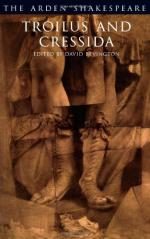|
This section contains 4,335 words (approx. 15 pages at 300 words per page) |

|
SOURCE: "Myth and Anti-Myth: The Case of Troilus and Cressida," in Shakespeare Quarterly, Vol. 31, No. 1, Spring, 1980, pp. 76-84.
In the following essay, Cole examines Shakespeare's subversive treatment of mythic figures in Troilus and Cressida, asserting that "Shakespeare exposes the tendency of men to idealize their errors of judgment and their self-serving passions under the guise of heroic or chivalric myth."
Though The Gods have little enough to do with the events of this play, I begin nonetheless with an invocation: to Ishtar, Babylonian goddess of love and war—whose worship involved ritual prostitution, and to whom Solomon (for all his wisdom) built a temple. Ishtar, even though Shakespeare could not know her, hovers as reigning goddess over the fields and chambers of Troy. Helen is her priestess, and Pandarus her prophet. Thersites plays the role of archetypal Adversary: "Lechery, lechery; still wars and lechery; nothing else holds fashion...
|
This section contains 4,335 words (approx. 15 pages at 300 words per page) |

|


